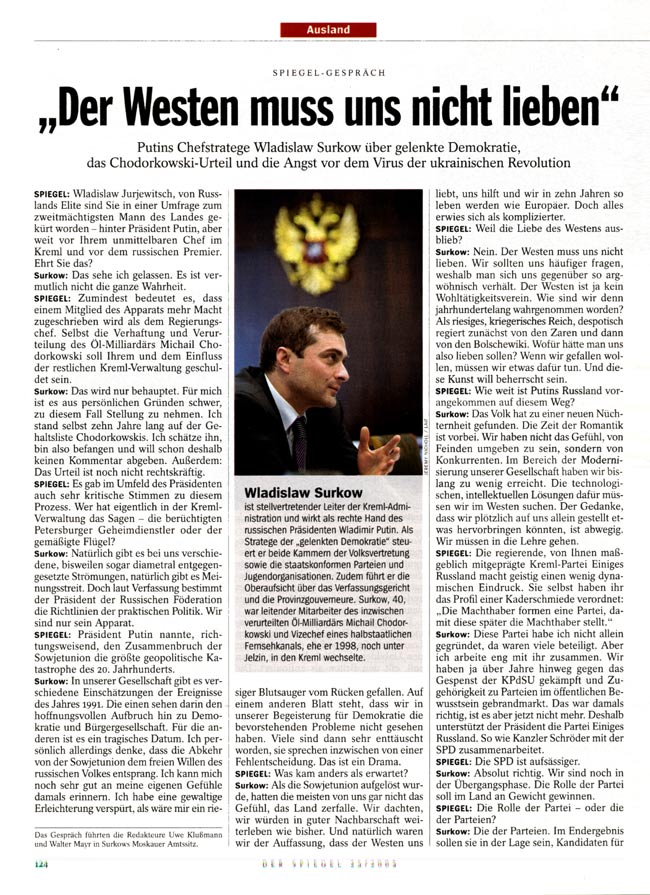Vladislav Sourkov, President Putin’s main man in charge, who usually refuses any contact with the media, gave an interview to the German newspaper Der Spiegel. Russia’s number 2 sends a message to his European friends: the country’s not quite back on the tracks yet, and a peaceful outcome for the Chechen conflict is still impeded by opposition, within the State apparatus, of those who refuse a federal and multi-ethnic Russia, both Orthodox and Muslim. The risk of a coup d’État, as in 1991, cannot be dismissed.

Experts simply love such interviews as the one which Vladislav Surkov, deputy chief of the Kremlin staff, granted to the German magazine Der Spiegel [1].
In the past few years, the Kremlin started speaking openly about the internal political situation but rarely, only in the presidential addresses to the parliament or during the president’s press conferences, and television and Internet question and answer sessions, which are held once a year. But ranking Kremlin officials also make rare but telling statements in the Russian and foreign press.
Shortly before the 2004 presidential election, Dmitry Medvedev, the chief of the presidential administration, outlined the key political tasks of the election cycle in an article for the Financial Times. The Russian political class surely reads such statements too.
The 2008 presidential campaign is almost around the corner. Surkov’s interview to Spiegel was a laconic but frank survey of the political problems facing Russia and its administration on the eve of the election, which, like any change of power, will bring about elements of instability.
When speaking about the situation in Russia, Surkov did not mention economic processes and reforms. This omission shows that the Kremlin does not regard the current economic policy (the replacement of social benefits in-kind with cash compensations, the forthcoming transition to paid education and health care and public protests against these reforms) as a serious threat to the Kremlin’s policy both before and after the next presidential election in 2008. The only exception is the situation in Chechnya, where unemployment has reached 70 % (though the figure may be exaggerated). Surkov described it as "catastrophe."
But there are bigger threats in the Caucasus. Apart from the monopoly rule of the local clans and the alienation of the region from the rest of Russia, it suffers from Islamic radicals, both local and foreign, whose task is substantially facilitated, as Surkov said, by "the numerous errors" permitted by the authorities.
On the whole, the Kremlin’s position on the North Caucasus, where the war has ended but terrorism has not been eradicated, remains consistent: The Caucasus should remain part of Russia and nobody will talk with terrorists, who should be imprisoned.
Terrorism remains a most serious threat to the country. "There is a sway of terror in the country," Surkov said referring to the 250 terrorist attacks registered in Russia last year. The main objective of the authorities is to stop the chauvinistic pro-fascist forces from provoking an outburst of Islamic extremism, which would endanger the integrity of the multinational Orthodox-Islamic Russia.
Surkov apparently views the actions of Russian extremist nationalist organizations (such as Eduard Limonov’s National Bolshevik Party, whose members recently occupied the Health Ministry and blocked the Kremlin gate) as the fuse that could ignite ethnic conflicts. But some Russian analysts think that a possible link of Russian nationalists with Islamic radicals spearheaded against the current authorities poses a much greater threat to political stability.
The ideologists and politicians of the "orange" tint are pondering such scenarios for Russia. Strangely, they are not afraid to mix the fascist brown and the Islamic green colors with the democratic colors of the recent revolutions in the CIS. No matter what color the cat is, it should catch the mice, meaning rock the regime.
Though Surkov knows about such attempts at destabilizing the regime, he does not think they can succeed, whatever their color. "There will be no revolutions" in Russia, he said, though "coups could be attempted."
The word "coup" sounds significant and alarming when uttered by a ranking Kremlin official and "Russia’s second top man," as Spiegel wrote about Surkov. But the deputy chief of the presidential staff immediately tried to cushion the effect: "So far, they are standing on trembling feet."
Frankness was the gem of his interview: Surkov did not claim that Russia had a potent antidote from "orange" revolutions. A multiparty system should become such an antidote, but it has problems.
"Our multiparty system is not stable," Surkov said. "It is one of our biggest weaknesses." The ideal goal, so far unfeasible, is for the parties to become strong enough to nominate candidates for the presidency and to the government. Though United Russia, which has a constitutional majority in the State Duma, is claiming a place in the right-wing/conservative part of the political range, its members do not have a clear ideology and hence there is no political and ideological unity in United Russia.
But the main problem is that "with the current format of the parliament, it is difficult to imagine to whom power could be handed over without conflicts. Take the Communists or Rodina (Homeland)," Surkov said, "I respect them but cannot imagine what would happen to the country if they came to power."
titre documents joints
Avis de demande et demande de contrôle judiciaire
Texte intégral de l’avis de demande et de la demande de contrôle judiciaire auprès de la Cour fédérale du Canada
(MNG - 67 KiB)
[1] « Der Western muss uns nicht lieben » by Uwe Klussmann and Walter Mayr. Der Spiegel, June 20th 2005.

 Articles by this author
Articles by this author




















Stay In Touch
Follow us on social networks
Subscribe to weekly newsletter